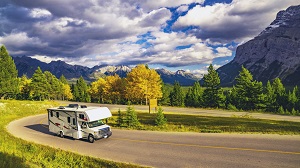
Storing Your RV This Fall
If your family used your RV this summer, you probably had a great time traveling. But, now, it’s time to go back to school and work. So, what happens to your set of wheels in the meantime? You might not use your RV every day in the coming months, but that doesn’t mean you can neglect it. What are some of the protective steps you can take when storing the vehicle?
Preventive Maintenance For RV Storage
When you don’t use an RV regularly, it might fall into disrepair. That increases the potential for damage from storage, the elements or other factors. You don’t want this to happen because of the repair costs that might result.
As an added consequence, RV insurance might not cover damage caused by wear and tear, or neglect. So, repairs that result from storage neglect might fall on your shoulders. Do whatever you can to prevent storage damage in the first place.
- Have any standard maintenance performed before storing the RV. Many vehicles will have storage recommendations. You might need to replace the oil, change the engine fluid, elevate the vehicle, and more. Test your battery and engines now as well.
- Remove all sensitive items from the vehicle. Things to take out include perishable food, water, bedding and electronics.
- Shut down and cover all appliances, water spouts and furniture. Clean out the waste, water and gas lines.
- Clean the interior. Use strong cleaning solutions that will not harm surfaces. Consider placing pest traps in the interior.
- If you place the vehicle in a garage or shed, make sure it remains guarded from the elements. Keep the building locked, and keep an eye out for any intruders or elements that might damage the vehicle.
- When storing the vehicle outside, keep the RV locked and the security system armed. Cover the vehicle with a tarp, or place it under a carport
Ask About Insurance Options While The Vehicle Is In Storage
During storage periods, you might not need as much RV insurance. After all, you won’t drive, which might make certain types of coverage obsolete.
Ask your agent if your policy offers a storage option. By activating this option, you can reduce coverage you won’t likely use, such as collision insurance. However, your comprehensive coverage and other types of protection might remain active. Therefore, you’ll have protection where it matters.
Still, you won’t have to worry about paying excessive costs for protection you don’t use. You can reactivate full coverage when you take the vehicle out of storage.
So, if you are getting ready to store your vehicle, don’t hesitate to contact one of our agents. We’ll help you make sure your coverage provides adequate security.
Categories: Blog
